SectionA
人教8下Unit9 Section A(3a-3c)教学设计

八下英语Unit9 sectionA 3a--3c教案一 Teaching goals:(一)Knowledge Aim .掌握一些重要的单词短语如invent progress rapid unusual encourage improve并如何表达现在完成时。
(二)Ability Aim用所学的语言have /has been to去描述某人曾经去过哪些有趣的地方。
(三)Emotion Aim了解国家和世界一些博物馆并热爱祖国悠久的历史。
二Important and difficult points (教学重难点)1 Key points掌握重要的一些短语和词汇和Have you ever been to ----?句式。
2 Difficult point学会描述去博物馆的句子。
三Teaching methodsCooperation and communication四Teaching aidsMultimedia devices and PPt documents五Teaching stepsTeaching of new lesson :Step 1 Lead--inAsksome: questions Have you ever been to an amusement park? Yes, I have.Me, too.Have you ever been to a history museum?No, I haven’t.Me neither.Step 2 Warm upAsk:Have you ever been to the museum?Look at some pictures of the Science Museum in London and talk about them.Pairwork:A: Have you ever been to…?B: No, I haven’t. / No, never. How about you?A: Me neither. / Neither have I.Step 3 Pre-taskAsk:Have you ever been to the Computer Museum?Have you ever been to the International Museum of Toilets? Have you ever been to the Hangzhou National Tea Museum?Step 4Presentation(一)3a:Read the magazine article and answer the questions.1.Which three museums do the students talk about?2. What do you think is the most interesting thing about each museum?(二)3b:Read the article again and answer the following questions.1What does Ken say about the American Computer Museum?2. What can we learn at the International Museum of Toilets?3. Why is the Hangzhou National Tea Museum a nice place to enjoy tea?(三)3c:Which of the underlined words in the passage have the following meanings(四)Free talk:Have you ever visited National Museum of China? (五)wacth a vidioDo you know these museums?Step5 Grammar FocusLanguage points1 Invent invent, discover, find, find out, look for2 It’s unbelievable that …令人难以置信的是…3 progress v. 取得进步,进展progress n. 进步,进展 make progress 取得进步;取得进展4 rapid adj. 快的;迅速的辨析:quick, rapid, fast5 even6 be able to 强调通过努力而获得的能力7 unusual adj. 不平常的8 encourage ... to ... 鼓励……做……9 improve作及物动词时,意为“改进;改善;提高”;作不及物动词时,意为“有改进;好一些”。
Section-A-内容详解
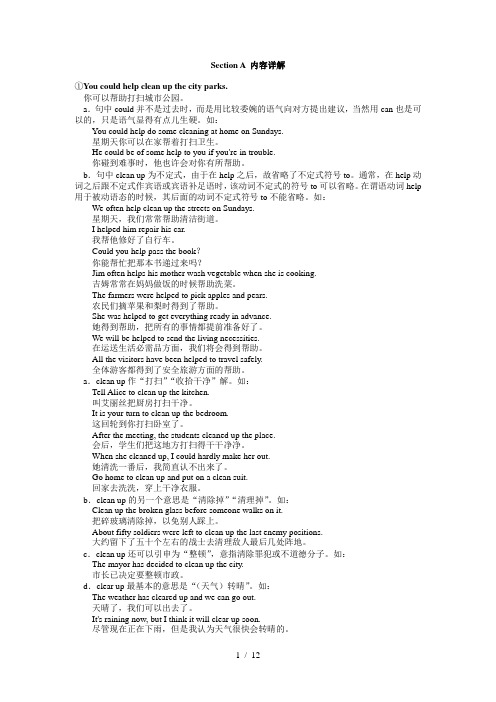
Section A 内容详解①You could help clean up the city parks.你可以帮助打扫城市公园。
a.句中could并不是过去时,而是用比较委婉的语气向对方提出建议,当然用can也是可以的,只是语气显得有点儿生硬。
如:You could help do some cleaning at home on Sundays.星期天你可以在家帮着打扫卫生。
He could be of some help to you if you're in trouble.你碰到难事时,他也许会对你有所帮助。
b.句中clean up为不定式,由于在help之后,故省略了不定式符号to。
通常,在help动词之后跟不定式作宾语或宾语补足语时,该动词不定式的符号to可以省略。
在谓语动词help 用于被动语态的时候,其后面的动词不定式符号to不能省略。
如:We often help clean up the streets on Sundays.星期天,我们常常帮助清洁街道。
I helped him repair his car.我帮他修好了自行车。
Could you help pass the book?你能帮忙把那本书递过来吗?Jim often helps his mother wash vegetable when she is cooking.吉姆常常在妈妈做饭的时候帮助洗菜。
The farmers were helped to pick apples and pears.农民们摘苹果和梨时得到了帮助。
She was helped to get everything ready in advance.她得到帮助,把所有的事情都提前准备好了。
We will be helped to send the living necessities.在运送生活必需品方面,我们将会得到帮助。
人教 八年级上册第一单元Section A 1a—2d(共49张PPT)
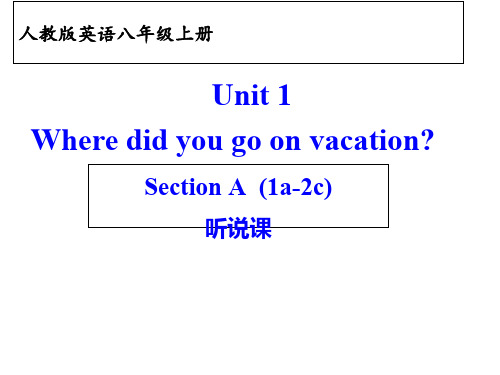
1. — Where did you go on vacation? — I went to the mountains. / …
2. Did you…? Yes, I did. / No, I didn’t.
Talk about past events.
my summer vacation
visited museums
visited my uncle
went to the mountains went to summer camp
Read aloud and remember them: went to New York City
went to the beach
visited museums stayed at home onversations
1、4 or 6 students in one group 2、Play the conversations in real situation 3、Practice for 4-6 mins 4、Show us in the front of the class
conversation1
A: Where did you go on vacation,Grace? B: I went to New York City. A: Oh, really? Did you go with anyone? B: Yes, I w__e_n_t_with my mother. A: Did you go to Central Park? B: Yes, I did . It was really nice. A: Did you buy an__y_th_in_g_s_p_e_c?ial B: Yes, I bought something for my father. A: Oh, really? What? B: _I_bo_u_gh_t_h_im a__hat.
Section A

Practice
(5 minutes)
1. Group work
2. Group work
3. Group work
4. Pair work and
individual work
5. The whole
class work
5. Recite the rules in a
chant. Students can dance to the rhythm.
6. Fill in the blanks
according to the chant. Students can work in groups.
7. Check and revise the
1. The whole
class work
2. The whole
class work and
individual
Work
3. The whole
class work andgroup work
4. The whole
class work
1. Focus their attention
on the teacher.
share in the class.
5. Students read after the
tape sentence by sentence.
6. Students read 1b by
themselves, and group leaders check and help group members.
Consolidation
(15 minutes)
1.Individual
【精选】大学英语第四册课文翻译(含Section A与 Section B,目前最完整的翻译)
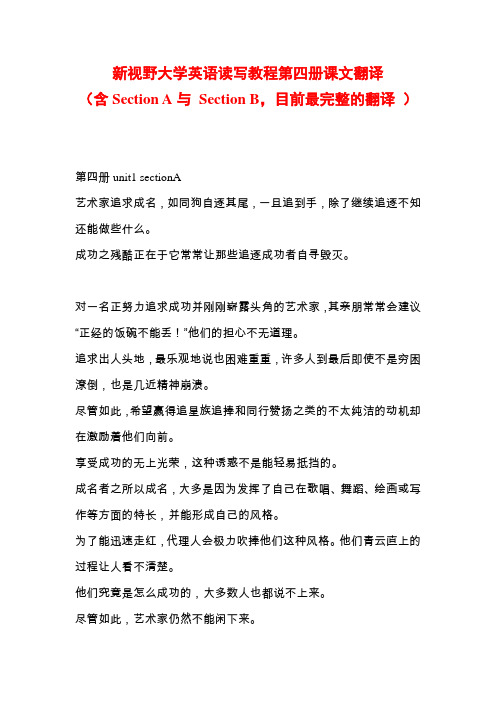
新视野大学英语读写教程第四册课文翻译(含Section A与Section B,目前最完整的翻译)第四册unit1 sectionA艺术家追求成名,如同狗自逐其尾,一旦追到手,除了继续追逐不知还能做些什么。
成功之残酷正在于它常常让那些追逐成功者自寻毁灭。
对一名正努力追求成功并刚刚崭露头角的艺术家,其亲朋常常会建议“正经的饭碗不能丢!”他们的担心不无道理。
追求出人头地,最乐观地说也困难重重,许多人到最后即使不是穷困潦倒,也是几近精神崩溃。
尽管如此,希望赢得追星族追捧和同行赞扬之类的不太纯洁的动机却在激励着他们向前。
享受成功的无上光荣,这种诱惑不是能轻易抵挡的。
成名者之所以成名,大多是因为发挥了自己在歌唱、舞蹈、绘画或写作等方面的特长,并能形成自己的风格。
为了能迅速走红,代理人会极力吹捧他们这种风格。
他们青云直上的过程让人看不清楚。
他们究竟是怎么成功的,大多数人也都说不上来。
尽管如此,艺术家仍然不能闲下来。
若表演者、画家或作家感到无聊,他们的作品就难以继续保持以前的吸引力,也就难以保持公众的注意力。
公众的热情消磨以后,就会去追捧下一个走红的人。
有些艺术家为了不落伍,会对他们的写作、跳舞或唱歌的风格稍加变动,但这将冒极大的失宠的危险。
公众对于他们藉以成名的艺术风格以外的任何形式都将不屑一顾。
知名作家的文风一眼就能看出来,如田纳西?威廉斯的戏剧、欧内斯特?海明威的情节安排、罗伯特?弗罗斯特或T.S.艾略特的诗歌等。
同样,像莫奈、雷诺阿、达利这样的画家,希区柯克、费里尼、斯皮尔伯格、陈凯歌或张艺谋这样的电影制作人也是如此。
他们鲜明独特的艺术风格标志着与别人不同的艺术形式上的重大变革,这让他们名利双收,但也让他们付出了代价,那就是失去了用其他风格或形式表现自我的自由。
名气这盏聚光灯可比热带丛林还要炙热。
骗局很快会被揭穿,过多的关注带来的压力会让大多数人难以承受。
它让你失去自我。
你必须是公众认可的那个你,而不是真实的你或是可能的你。
【最新】人教版初中英语课标版 九年级第四单元Section A (3a—3b) (共18张PPT)
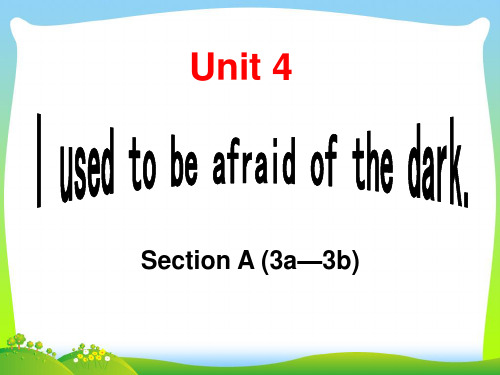
They really require ___a_l_o_t_o_f_t_a_le_n_t__a_n_d_h_a_r_d__w_o_r.k
Only a small number of people _m_a_k_e__it__to__th_e__t_o_p___. What does the word "require" mean?
now
1.She used to be shy.
2.She didn’t use to be _p_o_pu_la_r__in school.
3.She used to h_a_n_g _o_ut__with friends.
4.She didn’t use to __w_or_r_y _a_bo_u_t_____how she appeared to others.
VS
Lu Han used to be __s_h_y__,but now he is _n_o_t__s_h_y.anymore
From Shy Girl to Pop Star Candy Wang a pop star
Task 1 Skimming (跳读)
Read quickly and number the main idea of each paragraph(1-3).
Candy Wang 19 years old Asia
Job
singer/pop star
Personality She used to be shy ,
Now she is not ___s_h_y _a_n_y_m_o_r_e__.
Section A 短对话 Directions

Section A 短对话Directions: In this section, you will hear 8 short conversations and 2 long conversations. At the end of each conversation, one or more questions will be asked about what was said. Both the conversation and the questions will be spoken only once. After each question there will be a pause. During the pause, you must read the four choices marked A), B), C) and D), and decide which is the best answer. Then mark the corresponding letter on Answer Sheet 2 with a single line through the centre. 11. W: What's wrong with your phone, Gary? I tried to call you all night yesterday. M: I'm sorry. No one's able to get through yesterday. My telephone was disconnected by the phone company. Q: What does the woman ask the man about? 12. W: I finally found a really nice apartment that's within my price range. M: Congratulations! Affordable housing is rare in this city. I've been looking for a suitable place since I got here six months ago. Q: What does the man mean? 13. M: I got this in my mailbox today, but I don't know what it is. Do you have any idea? W: Oh, that's your number for the new photocopier. It acquires an access code. Everyone got one. Q: What do we learn from the conversation? 14. W: Jane told me that you'll be leaving at soon. Is it true? M: Yeah, my wife's maternity leave is close to an end. And since she wants to go back to work, I've decided to take a year off to raise the baby. Q: What does the man mean? 15 M: We'll never find a parking space here. What about dropping you at thesouth gate and I'll find parking somewhere else. W: Well, OK. It looks like everyone in town came to the mall today. Q: What does the woman mean? 16 W: When will the computers be back online? M: Probably not until tomorrow. The problem is more complicated than I thought. Q: What does the man mean? 17 M: Did you catch Professor Smith on TV last night? W: I almost missed it, but my mother just happened to be watching at home and gave me a call. Q: What does the woman imply? 18 M: May I get this prescription refilled? W: I'm sorry, sir, but we can't give you a refill on that. You'll have to get a new prescription. Q: What can we infer from the conversation?Conversation One W: Well, it’s the South Theater Company. They want to know if we’d be interested in s ponsoring a tour they want to make to East Asia. M: East Asia? uhh… and how much are they hoping to get from us? W: Well, the letter mentions 20,000 pounds, but I don’t know if they might settle for us. M: Do they say what they would cover? Have they anything specific in mind? W: No, I think they are just asking all the firms in tongue for as much money as they think they’ll give. M: And we are worth 20, 000 pounds, right? W: It seems so. M: Very flattering. But I am not awfully happy with the idea. What we get out of it? W: Oh, good publicity I suppose. So what I suggest is not that we just give them a sum of money, but that we offer to pay for something specific like travel or something, and that in return, we ask for our name to be printed prominently in the program, and that they give us free advertising space in it. M: But the travel bill would be enormous, and we could never manage that. W: I know. But why don’t we offer to pay for the printing of the programs ourselves on condition that on the front cover there's something like This program is presented with the compliments of Norland Electronics, and free advertising of course. M: Good idea. Well, let’s get back to them and ask what the program they want will cost. Then we can see if we are interested or not. Questions 19-21 are based on the conversation you have just heard. 19. What do we learn about the South Theater Company? 20. What benefit does the woman say their firm can get by sponsoring the Theater Company? 21. What does the woman suggest they do instead of paying the South Theater Company’s travel expenses? Conversation Two W: Rock stars now face a new hazard --- voice abuse. After last week's announcement that Phil Collins might give up touring becauselive concerts are ruining his voice, doctors are counseling stars about the dos and don'ts of voice care. Here in the studio today, we have Mr. Paul Phillips, an expert from the High Field Hospital. Paul, what advice would you give to singers facing voice problems? M: If pop singers have got voice problems, they really need to be more selective about where they work. They shouldn't work in smoky atmospheres. They also need to think about resting their voices after a show. Something else they need to be careful about is medicines. Aspirin, for example, singers should avoid aspirin. It thins the blood. And if a singer coughs, this can result in the bruising of the vocal cords. W: And is it true that some singers use drugs before concerts to boost their voices when they have voice problems? M: Yes, this does happen on occasion. They are easily-available on the continent and they are useful if a singer has problems with his vocal cords and has to sing that night. But if they are taken regularly, they cause a thinning of the voice muscle. Most pop singers suffer from three things: lack of training, overuse and abuse of the voice, especially when they are young. They have difficult lives. When they go on tour, they do a vast number of concerts, singing in smoky placesW: So, what would you advise the singers to do? M: Warm you voice up before a show and warm it down after. Questions 22-25 are based on the conversation you have just heard. 22. What does last week's announcement say about rock star, Phil Collins? 23. What does Paul Philips say about aspirin? 24. What does Paul Philips say about young pop singers? 25. What are the speakers mainly talking about? Passage 1 Would you trust a robot to park your car? The question will confront New Yorkers in February as the city's first robotic parking opens in Chinatown. The technology has been successfully applied overseas, but the only other public robotic garage in the United States has been troublesome, dropping vehicles and trapping cars because of technical problems. Nonetheless, the developers of the Chinatown garage are confident with the technology and are counting on it to squeeze 67 cars in an apartment-building basement that would otherwise fit only 24, accomplished by removing a maneuver space normally required. A human-shaped robot won't be stepping into your car to drive it. Rather, the garage itself does the parking. The driver stops the car on a flat platform and gets out. The platform is lowered into the garage, and it is then transported to a vacant parking space by a computer-controlled device similar to an elevator that also runs sideways. There is no human supervision, but an attendant will be on hand to accept cash and explain the system to newly users. Parking rates will be attracted about $400 monthly or $25 per day, according to Ari Milstein, the director of planning for Automation Parking Systems, which is the U.S. subsidiary of a German company. This company has built automated garages in several countries overseas and in the United States for residents of a Washington, D.C. apartment building. Questions 26 to 29 are based on the passage you have just heard. 26. What do we learn about the robot parking in the U.S. so far? 27. What advantage does robotic parking have according to the developers? 28. What does the attendant do in the automated garage? 29. What does the company say about the parking rate? Passage 2 A recent study shows that meat consumption is one of the main ways that human can damage the environment, second only to the use of motor vehicles. So how can eating meat have a negative effect on the environment? For a start, all animals, such as cows, pigs and sheep, always gas limed methane, which is the second most common green house gas after carbon dioxide. Many environmental experts now believe that methane is more responsible for global warming than carbon dioxide. It is estimated that 25% of all methane that released into the atmosphere coming from farm animals. Another way in which meat production affects theenvironment is through the use of water and land. 2,500 gallons of water are needed to produce one pound of beef. While 20 gallons of water are need to produce one pound of wheat. One acre of farmland use to for raising cows can produce 250 pounds of beef. One acre of farmland use to for crop production canproduce 1,500 pounds of tomatoes. Many people now say the benefits of switching to vegetarian diet which excludes meat and fish. Not just for health reasons, but also because it plays a vital role in protecting the environment. However, some nutritionists advise against switching to a totally strict vegetarian diet. They believe such a diet which includes no products from animal sources can be deficient in many of the necessary vitamins and minerals our bodies need. Today many people have come to realize that help the environment and for the human race to survive, more of us will need to become vegetarian. Questions 30 to 32 are based on the passage you've just heard.30. What does the recent study show? 31. What do some nutritionists say about the strict vegetarian diet? 32. What does the speaker think more people need to do? Passage 3 Alcoholism is a serious disease. Nearly nine million Americans alone suffer from the illness. Many scientists disagree about what the differences are between the alcohol addict and social drinker. The difference occurs when someone needs to drink. And this need gets in the way of his health or behavior. Alcohol causes a loss of judgment and alertness. After a long period, alcoholism can deteriorate the liver, the brain and other parts of the body. The illness is dangerous, because it is involved in half of all automobile accidents. Another problem is that the victim often denies being an alcohol addict and won’t get help. Solutions do exist. Many hospitals and centers help patients cope. Without the assistance, the victim can destroy his life. He would detach himself from the routines of life. He may lose his employment, home or loved ones. All the causes of the sickness are not discovered yet. There is no standard for a person with alcoholism. Victims range in age, race, sex and background. Some groups of people are more vulnerable to the illness. People from broken homes and North American Indians are two examples. People from broken homes often lack stable lives. Indians likewise had the traditional life taken from them by white settlers who often encourage them to consume alcohol to prevent them from fighting back. The problem has now been passed on. Alcoholism is clearly present in society today. People have started to get help and information. With proper assistance, victims can put their lives together one day. Question 33 to 35 are based on the passage you have just heard. Q33. What is the problem of the victims about alcoholism according to the speaker? Q34. Why did white settlers introduce alcohol to Indians? Q35. What does the speaker seem to believe about those affected by alcoholism? 复合式听写Self-image is the picture you have of yourself, the sort of person you believe you are. Included in your self-image are the categories in which you place yourself, the roles you play and other similar descriptors you use to identify yourself. If you tell an acquaintance you are a grandfather who recently lost his wife and who does volunteer work on weekends, several elements of your self-image are bought to light —the roles of grandparent, widower and conscientious citizen. But self-image is more than how you picture yourself; it also involves how others see you. Three types of feedback from others are indicative of how they see us: conformation, rejection, anddisconfirmation. Conformation occurs when others treat you in a manner consistent with who you believe you are.You believe you have leadership abilities and your boss put you in charge of a new work team. On the other hand, rejection occurs when others treat you in a manner that is inconsistent with yourself definition. Pierre Salinger was appointed senator from California butsubsequently lost his first election. He thought he was a good public official, but the voters obviously thought otherwise— Their vote was inconsistent with his self-concept. The third type of feedback is disconfirmation, which occurs when others fail to respond to your notion of self by responding neutrally. A student writes what he thinks is an excellent composition, but the teacher writes no encouraging remarks. Rather than relying on how others classify you, consider how you identify yourself. The way in which you identify yourself is the best refection of yourself-image.。
Section A 内容详解
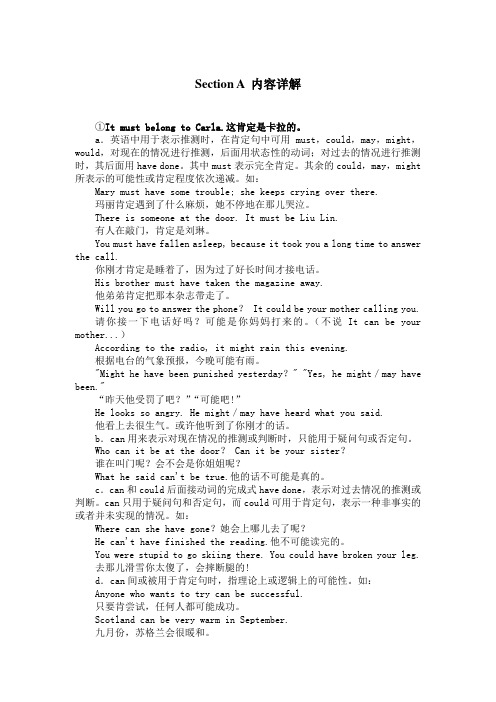
Section A 内容详解①It must belong to Carla.这肯定是卡拉的。
a.英语中用于表示推测时,在肯定句中可用must,could,may,might,would,对现在的情况进行推测,后面用状态性的动词;对过去的情况进行推测时,其后面用have done。
其中must表示完全肯定。
其余的could,may,might 所表示的可能性或肯定程度依次递减。
如:Mary must have some trouble; she keeps crying over there.玛丽肯定遇到了什么麻烦,她不停地在那儿哭泣。
There is someone at the door. It must be Liu Lin.有人在敲门,肯定是刘琳。
You must have fallen asleep, because it took you a long time to answer the call.你刚才肯定是睡着了,因为过了好长时间才接电话。
His brother must have taken the magazine away.他弟弟肯定把那本杂志带走了。
Will you go to answer the phone? It could be your mother calling you.请你接一下电话好吗?可能是你妈妈打来的。
(不说It can be your mother...)According to the radio, it might rain this evening.根据电台的气象预报,今晚可能有雨。
"Might he have been punished yesterday?" "Yes, he might/may have been."“昨天他受罚了吧?”“可能吧!”He looks so angry. He might/may have heard what you said.他看上去很生气。
人教版七年级下册英语Unit 1 Section A (1a-2d)
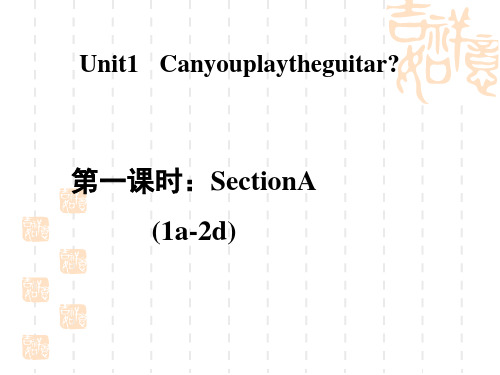
2a
Listentothesetwoconversationsandcircletheclubsyouh ear.
a. Englishclub b. artclub c. musicclub d. chessclub e. swimmingclub
—Whatclubdoyouwanttojoin? 7 —Iwanttojointhechessclub.
e.g. MayIspeaktoLucy? 我可以和露西通话吗?
① 辨析:speak, say, talk与tell
tellsb.
sth.= tellsth.
vt. 说(某种
①speak+语言 说某种语
tsopsbe.a 告某诉人k
语言)vi. 说 话
言 ②speak to sb. 跟某人说
某事
话
________.
English
3. MEanryglliiksehsmusic. Shecan_______and_______. Boblikes
music, too. Theywanttojointhe________club.
sing
dance
music
2b
Conversation 1 David: What club do you want to join, Lisa? Lisa: I want to join the chess club. David: Can you play chess? Lisa: No, I can’t. What about you, John? John: I can.
a2
f3
—Iwanttojointheartclub.
4
—Canyoudraw?
初中英语section a教案
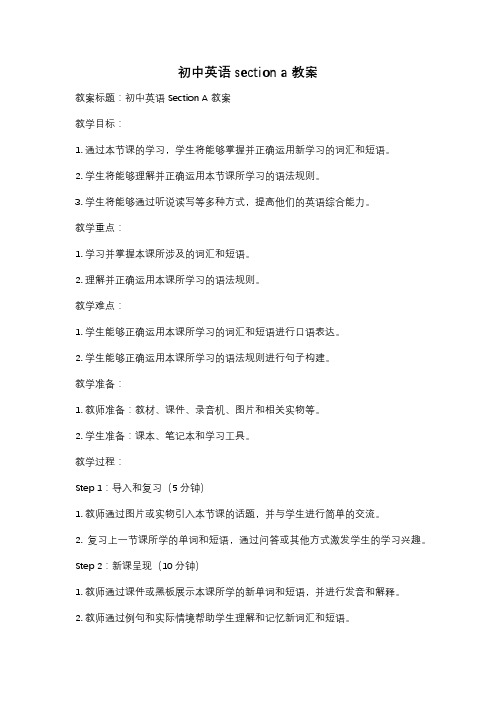
初中英语section a教案教案标题:初中英语 Section A 教案教学目标:1. 通过本节课的学习,学生将能够掌握并正确运用新学习的词汇和短语。
2. 学生将能够理解并正确运用本节课所学习的语法规则。
3. 学生将能够通过听说读写等多种方式,提高他们的英语综合能力。
教学重点:1. 学习并掌握本课所涉及的词汇和短语。
2. 理解并正确运用本课所学习的语法规则。
教学难点:1. 学生能够正确运用本课所学习的词汇和短语进行口语表达。
2. 学生能够正确运用本课所学习的语法规则进行句子构建。
教学准备:1. 教师准备:教材、课件、录音机、图片和相关实物等。
2. 学生准备:课本、笔记本和学习工具。
教学过程:Step 1:导入和复习(5分钟)1. 教师通过图片或实物引入本节课的话题,并与学生进行简单的交流。
2. 复习上一节课所学的单词和短语,通过问答或其他方式激发学生的学习兴趣。
Step 2:新课呈现(10分钟)1. 教师通过课件或黑板展示本课所学的新单词和短语,并进行发音和解释。
2. 教师通过例句和实际情境帮助学生理解和记忆新词汇和短语。
Step 3:语法讲解(15分钟)1. 教师通过课件或黑板讲解本节课所学的语法规则,并提供相关例句进行解释。
2. 教师通过练习题和实例引导学生进行语法规则的运用和巩固。
Step 4:听说训练(15分钟)1. 教师播放录音,并要求学生跟读和模仿录音中的对话和句子。
2. 教师组织学生进行小组讨论或角色扮演,运用所学的词汇和语法进行口语练习。
Step 5:阅读训练(15分钟)1. 教师组织学生进行课文阅读,然后提问相关问题,检查学生对课文的理解程度。
2. 教师指导学生进行阅读理解练习,巩固学生的阅读能力。
Step 6:写作训练(15分钟)1. 教师提供写作任务,并给予学生写作指导和范文示范。
2. 学生按照要求进行写作练习,并互相交流和修改作文。
Step 7:作业布置和小结(5分钟)1. 教师布置相关的课后作业,巩固学生对本节课所学内容的掌握。
人教版英语九年级上册 Unit 6 Section A (3a-3c)

While-reading
3b Read the passage again and answer the questions.
1. When was tea first drunk? It was first drunk about 5000 years ago. 2. How was tea invented? Some leaves from a tea plant fell into some boiling drinking water over an open fire. It produced a nice smell and tasted delicious. This is how tea was invented.
2. Tea was first ___d_r_u_n_k___ by Shen Nong 5,000 years ago.
3. A nice smell was _p_r_o_d_u_c_e_d_ when the tea leaves dropped into the hot water.
4. Tea was __b_r_o_u_g_h_t__to Korea and Japan during the 6th and 7th centuries.
popularity n. 先锋;先驱 doubt v. 列表;清单 / n. 名单;清单
without doubt v. 提到;说到
Do you know what is the most representative beverage in China?
green tea black tea
Tea has a long history in China. Many people believe that the history of tea can be traced back to 5,000 years ago. Do you know who invented tea? How was tea invented?
人教版英语九年级上册 Unit 4 Section A (3a-3c)

1. Candy told me that she used to be really shy and took up singing to deal with her shyness.
2. I didn’t use to be popular in school, but now I get tons of attention everywhere I go.
Candy. 1.She used to be shy, but now she’s not shy __a_n_y_m__o_r_e__. 2.She didn’t use to be ___p_o_p_u_l_a_r__ in school, but now she
gets lots of attention. 3.She used to __h_a_n_g_o_u_t___ with friends, but it is almost
4. Only a very small number of people make it to the top. to become the best “make it” means “succeed in doing sth.”
While-reading Read for details
Read the article and complete the chart.
人教版英语八年级上册 Unit1 Section A 经典高清课件
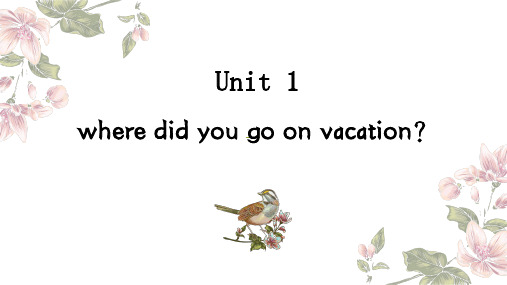
diary 英[ˈdaɪəri] n.日记; 日记簿;
例句:Did you keep a diary? 你有没有坚持写日记的习惯?
根据句意和提示写出所缺单词 1. The sofa is terribly heavy. Can you move it by yourself ?
Section A 课文 Can you anwser? 1. Did Helen go anywhere interesting? Helen 有没有去比较有意思的地方呢? 2. Did reck do anything special? Rick有没有做一些特殊的事情呢?
Yes, she did. She went to Guizhou with my family. Not really. I just stayed at home most of the time to
yourself
[jɔːrˈself] yourselves 英[jɔːˈsɛlvz] pron.你自己; (用以加强语气) pron.(反身代词)你自己; 您自己; 例句:Why didn't you buy something for you ?
为什么你没给你自己买一些东西呢? 注意:英文里面你是yourself,复数形式你们 yourselves.是变f为v加es,同时注意读音。
Did you see Huangguoshu Waterfall?
Helen: Yes, I did. What about you? (3) B
Rick: Not really. I just stayed at home most of the time to read and relax.
- 1、下载文档前请自行甄别文档内容的完整性,平台不提供额外的编辑、内容补充、找答案等附加服务。
- 2、"仅部分预览"的文档,不可在线预览部分如存在完整性等问题,可反馈申请退款(可完整预览的文档不适用该条件!)。
- 3、如文档侵犯您的权益,请联系客服反馈,我们会尽快为您处理(人工客服工作时间:9:00-18:30)。
3
10
Text Study—Structure Analysis
Transitional paragraph:(Para.8)
More comparison and contrast (Para.9~12)
Conclusion: (Para.13)
3
10
Text Study—Understanding
•
3
10
Text Study—Understanding
During the next forty years: (Para.7) John: His successes were reported in the press… Me: I was successful in my own line, writing about 30 bestsellers without a single failure.
3
10
Text Study—Structure Analysis
A retrospect sets the background of the story: (Para. 1~2) similarities and clues for further development
Comparison and contrast between John Bullyer and the writer (Para.3~7) Time marker 1: (Para. 3) Both of them started school on the same day. Comparison and contrast 1
3
10
Text Study—Summary
III. Summary
Fill in the blanks with the words and phrases you’ve learned from the text.
3
10
Text Study—Summary
TV host: H Writer: W John Bullyer: J H: Since you haven’t met each other before, how did you keep up to date with each other’s progress. mouth W: By word of ______ and by phrases that leaped out of letters. _____ J: We shared the same aunt. And she _______ to him far too referred often. H: Why did you say John did more to shape your life than any _____ other persons. comparisons W: Hundreds of ____________ were made between John and I from the age we ________ school till we’ve grown up. started
3
10
Text Study—Reproduction
IV. Reproduction
Work in pairs. One student role-plays a reporter while another student role-plays the writer. Have an interview with the writer and focus on the following points: 1. Who exerted the most influence on the writer? 2. Why was the writer spurred by a person whom he had not met ? 3. What did the writer imagine him to be before he actually met him?
More comparison and contrast: John Bullyer always thought about me as: Eight feet tall, handsome dynamic, and more able than anyone in the universe.
3
1
1
☺ Text Study ☺ Notes to the Text ☺ Words and Expressions ☺ Idea Sharing ☺ Writing
3
10
☺ Structure Analysis ☺ Understanding ☺ Summary ☺ Reproduction
3
II. Understanding
Describe Aunt Carrie in your words. (Para.1~2)
Tips: • favorite relative; authority figure; • smiles, words of praise, excuses; • often referred to John;
3
10
Text Study—Understanding
The time after their schooling: (Para.5~6) John: Went on well with math. Me: Worked with intensity at my writing craft; • Wrote with the desire to rise above John.
3
10
Text Study—Structure Analysis
Time marker 2: (Para. 4) Implied. But it was during the time of schooling. Comparison and contrast 2 Time marker 3: (Para. 5) “Time went on”— the time after their schooling. Comparison and contrast 3 Time marker 4: (Para. 7) During the next forty years. Comparison and contrast 4
10
Text Study—Understanding
I thought of John Bullyer as: An imposing man – nine feet high, better looking than ...
But he turned out to be: A short, fat man ...
10
Text Study—Structure Analysis
I. Structure Analysis
The writing model of Text A:
Comparison and contrast is the major writing method employed by the author. It is made through the line of time sequence at the whole structure.
3
10
Text Study—Understanding
The comparison and contrast of John and “me”
The first day to school: (Para.3) Me: My first day was disastrous.
John: Took to school like a duck to water.
3
10
Text Study—Understanding
Later that year, in November: (Para.8)
Event: The first time John Bullyer and I met each other.
3
10
Text Study—Understanding
3
10
Text Study—Summary
W: And I always thought of you as an _________ specimen of imposing _________ a man. I missed our aunt so much. If it were not her necessary push _________ to us, we would not have attained what we had.
3
10
Notes to the Text—Active Expressions
Find out the active expressions:
1. She was always free with smiles, words of praise, and excuses for misdoings. (L6) 2. She invariably referred to him as “Little-John-myother-nephew” all in one word,… (L9) 3. … had started school on the same day as I did and had taken to it like a duck to water. (L14) 4. By word …, by phrases …, I was kept up to date with John’s progress. (L22) 5. Then it probably dawned on us both that the place in which…(L64)
